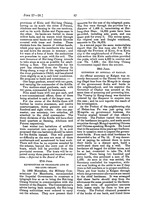| 1 |
 |
“...of them
being attached to each of the larger ones.
For the crews of the flotilla there will
further be twelve steersmen, and twelve
quartermasters, thirty gunners and one
hundred and eight rowers. Also one pay-
master, one secretary, two orderlies, all
attached to the chief commander. The
three divisions of the flotilla will have their
head quarters at Sansing, Altchuen and
Petuna respectively.
Last winter two battalions of artillery
were converted into cavalry. It is now
proposed that one battalion should be taken
for the flotilla instead. This will present
no diculty aa the men are moat of them
southerners and accustomed to boat work.
There will thus be no expense entailed by
the scheme, beyond the mere coat of the
boats, which will be provided from the
provincial revenue. The boats will be re-
paired every three years and renewed every
nine.Hcferred to the Board of tVar.
27th June.
EXPENDITURE ON TELEGRAPH LINE IN
HEI-LUNG CHIANG.
In 1886 Mutushan, the Military Com-
missioner for...”
|
|
| 2 |
 |
“...desires tu govern h.oiu Ili, is as far from
Ili as Ili is from Urumtsi. If the distance
is too great in the one case, why is it not
in the other also? There is one portion,
however, of the Connnander-in-Chiefs sug-
gestions which the memorialists think
might be adopted, namely his proposal
that part of the Chinese troops in Ili should
be attached to himself personally. The
Ili force consists of four thousand men.
It is recommended that one thousand of
these be formed into a Coin nmnder-iii-Chief3
battalion, the rest remaining with the
Chinese General. Similarly, of the two
thousand men under a Chinese Colonel at
Tarbagatai, live Hundred should be at-
tached to the Tartar Lieutenant-General
there. Besides having entire command
over the Bannermen, the Coniniander-in-
Chief will be charged with matters relating
to the Lamas, and to the Mongols, Kirghia
and other native tribes, as well as the
transaction of international business. Apart
from these, it is hoped that the whole ad-
ministration may be...”
|
|
| 3 |
 |
“...reports
that, in accordance with the sanction of
the Emperor which had already been ob-
tained, two bodies of cavalry, belonging to
Kirin and Hei-lung chiang, but recently
serving in Sheng ching, have been sent
back to their respective provinces for em-
ployment there ; also, a battalion of Mongol
cavalry has been sent home for the pur-
pose of being disbanded. The baggage
waggons required for these movements
have been supplied by the authorities of
the districts through which the troops pas-
sed ;and these officials will charge the
expenses thus incurred in their regular
accuunts. Before the troops departed, they
all received one uiontlis pay from the
Sheng-ching treasury. As previously ar-
ranged, a battalion of cavalry has been
raised locally in the place of those sent
away. The men and horses have all been
inspected and found to be healthy and
strong.
SHENO-CHING. PROHIBITION OF GKAJN EXPORT
REMOVED.
On account of the distress caused by the
terrible floods, which occurred last summer...”
|
|